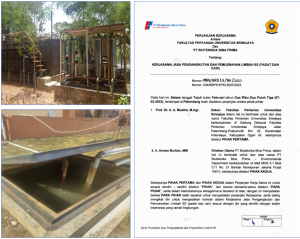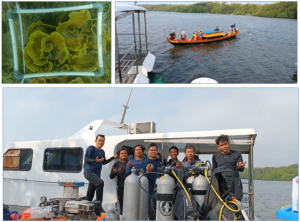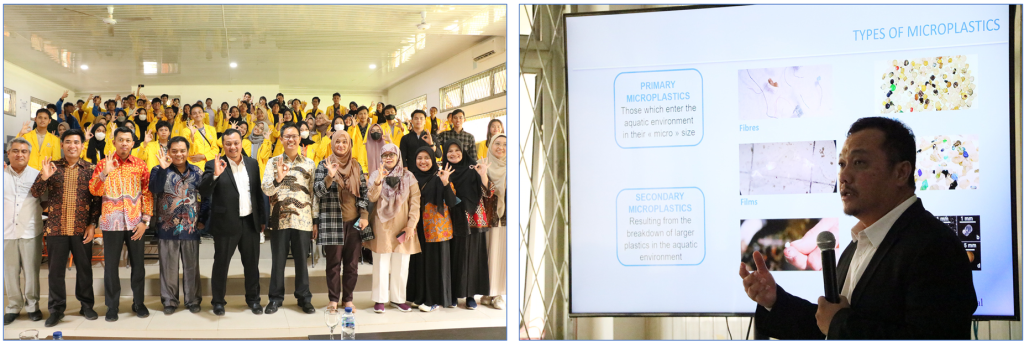
SDG 14 – Indicator 14.5.1 – Minimizing alteration of aquatic ecosystems (plan)
Liquid Waste Treatment as an Effort to Prevent Damage to Aquatic Ecosystems
Liquid waste is waste generated from various sources of activities involving liquids. Liquid waste can lead to changes in aquatic ecosystems due to its content of certain chemicals that are not environmentally friendly. This issue can be addressed by treating the liquid waste before it is discharged into the environment. In an effort to reduce the negative impact of liquid waste on aquatic ecosystems, Universitas Sriwijaya (UNSRI) has implemented liquid waste treatment before releasing it into the environment. Some of the treated liquid waste is also reused for watering plants. UNSRI has also collaborated with PT Biuteknika Bina Prima for the transportation and disposal of hazardous and toxic liquid waste. With these efforts, it is hoped that UNSRI can minimize ecosystem changes caused by chemical and biological substances.

Link:
SDG 14 – Indicator 14.5.2 – Monitoring the health of aquatic ecosystems
Monitoring of the Coral Reef Ecosystem in Enggano Sea
The coral reef ecosystem is a very important ecosystem for marine environments. Coral reefs provide a habitat for fish and other marine life, so it is crucial to maintain the health of the coral reefs. The Enggano Sea is one of the aquatic areas located off the coast of Sumatra Island. To assess the quality of the coral reefs in the Enggano Sea, the Universitas Sriwijaya (UNSRI) team conducted an observation of the coral reefs in 2023. The monitoring report indicated that the coral reef ecosystem in the Enggano Sea is in good condition and well-preserved. The seagrass beds in the area are also in good condition.

Links:
- https://daerahpost.com/advertorial/enggano-mesti-kita-jaga/
- https://forestsnews.cifor.org/82692/penelitian-lintas-bagian-karbon-biru-di-mangrove-kisah-dari-dua-pulau?fnl=en
- https://daerahpost.com/pendidikan/himaikel-unsri-lakukan-penelitian-kerumbuh-karang-di-pulau-enggano/
SDG 14 – Indicator 14.5.3 – Programmes towards good aquatic stewardship practices
UNSRI Holds a General Lecture on Marine Pollution
Marine pollution is one of the problems caused by human activities both in the water and on land. Indonesia, as an archipelagic country, has a vast marine area, and many people depend on the sea for their livelihood. Therefore, it is crucial to protect the sea from various types of pollution to ensure that marine resources remain available. One way to prevent marine pollution is by raising public awareness about the negative impacts of pollution. This can be done, for example, by holding public lectures and inviting experts in the field of marine pollution. In support of this, Universitas Sriwijaya (UNSRI) organized a public lecture on the theme “Microplastics in the Marine Environment: Current Conditions, Assessment Methodology, Impacts, and Solutions.” Through this public lecture, it is hoped that the participants will better understand the importance of protecting the sea, especially from plastic pollution.

Link:
SDG 14 – Indicator 14.5.4 – Collaboration for shared aquatic ecosystems
UNSRI Collaborates with Local Communities in Maintaining Aquatic Ecosystems
An aquatic ecosystem is an environment dominated by water and inhabited by a variety of living organisms. Protecting ecosystems is a shared responsibility, including by universities. Universitas Sriwijaya (UNSRI) is one of the higher education institutions located in South Sumatra. In an effort to support the sustainability of aquatic ecosystems, the UNSRI Community Service Team carried out an outreach program in collaboration with local communities and other universities (North Sumatra University). This activity was aimed at raising awareness among the local community, especially around the campus area, to protect the aquatic ecosystem, particularly in the region surrounding the Musi River in South Sumatra Province.

Link:
SDG 14 – Indicator 14.5.5 – Watershed management strategy
Wetland Conservation as an Effort to Preserve Local Freshwater Fish Species
South Sumatra Province is one of the provinces with extensive wetlands, covering around 1.475 million hectares. However, the area of wetlands or peat swamps in South Sumatra continues to decrease. This decline threatens the sustainability of local freshwater fish species. Another factor contributing to the decrease in local freshwater fish populations is unsustainable fishing practices, such as the use of poison and electric fishing. To address this issue, Sriwijaya University (UNSRI) is working to raise public awareness about preserving peat swamps, so that the population of local freshwater fish can be maintained, through community service activities.

Link:
